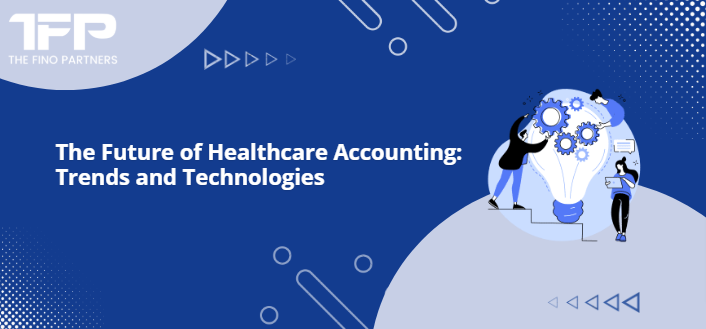How can medical businesses, clinics, and hospitals stay on budget while providing outstanding care? Medical finances are complicated - they include processing payments, processing costs and meeting regulations. That is exactly where healthcare accounting services come in to help.
Healthcare accounting is quickly changing with advancements in technology. The days of entering invoices manually, managing several spreadsheets and tackling mounds of paperwork are over. New trends and tools are accelerating the process of managing finances in healthcare organizations.
Keeping up with such changes is essential in case you operate a medical clinic. Identifying new trends will enable you to make better financial choices, save money and improve effectiveness. Let us explore the potential future of healthcare accounting services and how technology is influencing this essential business.
The Trend of Digital Accounting In Healthcare
Many healthcare providers still use paper invoices, manual bookkeeping and outdated software. These techniques are time consuming and also contain errors. They also make it tougher to track expenses, cash flow and generate reports.
Medical practices are moving toward digital accounting solutions as outsourced accounting services for healthcare are increasing. Such services provide cloud based financial management systems, automated bookkeeping and AI driven methods that ease the burden on in-house teams.
Some benefits of digital accounting in healthcare include:
- Faster, more precise financial reporting.
- Reduction in administrative burden on personnel.
- Improved cash flow management.
- More compliant with healthcare financial regulations.
With a lot more healthcare organizations implementing digital accounting, the financial control is better managed for greater profitability and smoother operations.
Emerging Technologies Changing Healthcare Accounting
Many new technologies are altering medical accounting services and healthcare. These innovations simplify procedures, enhance precision and help businesses make wise financial decisions.
1. AI and Machine Learning in Medical Accounting
Artificial intelligence (AI) and machine learning are substantially affecting healthcare accounting these days. Such technologies can analyze enormous quantities of financial data, find errors and even forecast financial trends.
For instance, AI-powered tools may:
- Automatically classify expenses & income.
- Detect fraudulent transactions.
- Find billing discrepancies.
- Make precise financial reports in real time.
With AI in healthcare accounting solutions, medical organizations can reduce manual mistakes and boost efficiency.
2. Automation in Accounts Payable and Receivable
Traditionally, Accounts Payable (AP) and Accounts Receivable (AR) procedures involve lots of manual labor. Healthcare facilities must process invoices and match payments and follow up on outstanding bills.
Automation simplifies this by:
- Digitizing invoices & receipts.
- Automating payment approvals.
- Sending automatic reminders for outstanding payments.
- Reduced processing time and human errors.
Several hospitals and clinics are embracing automated AP/AR solutions to simplify their financial operations and free staff to perform much more critical work.
3. Cloud-Based Healthcare Accounting Solutions
Cloud-based accounting systems provide healthcare providers access to their financial data from anywhere. Such solutions are particularly beneficial for multi-location healthcare organizations that would like a centralized place to control finances.
The benefits of a cloud accounting include:
- Gain access to financial data in real time.
- Data storage & backups are secure.
- Integration with other healthcare management software.
- Collaboration between accounting teams and healthcare administrators.
With cloud based solutions, hospital accounting outsourcing becomes more effective and financial experts can handle accounting tasks from anywhere with information security.
4. Business Intelligence & Predictive Analytics
Data-driven decision-making is becoming fundamental in healthcare financial management. Business intelligence (BI) tools examine historical financial data and predict future trends.
For instance, BI tools could support healthcare CFOs and administrators:
- Predict seasonal revenue variations.
- Determine cost saving opportunities.
- Optimize budgeting and resources allocation.
- Monitor financial health from several locations.
Predictive analytics is particularly helpful in healthcare finance management to enable businesses to plan for the unforeseen financial difficulties ahead of time.
The Role of Patient Payment Portals in Healthcare Accounting
How patients pay for healthcare services has also changed recently. Many patients expect digital payment options just as they do when shopping online. To accommodate these expectations, healthcare providers are adopting patient payment portals.
These portals enable patients to:
- View their medical bills online.
- Make payments with credit cards, digital banking or mobile wallets.
- Set up automated payment plans.
- Get electronic invoices rather than paper statements.
From an accounting standpoint, patient payment portals simplify billing and collections. They also enhance cash flow and decrease unpaid bills.
Trends in Healthcare Accounting Outsourcing In USA
Medical finances are getting more complex and more organizations are relying on healthcare accounting outsourcing services in USA. By outsourcing, health providers can concentrate on patient care while experienced accountants handle financial operations.
Outsourcing might offer:
- Expert financial management without an in-house team.
- Get the latest accounting software & technologies.
- Compliance with continually changing healthcare regulations.
- Eliminating overheads saves money.
Many small and mid sized healthcare practices are searching for an accountant for small businesses to handle their medical financial requirements. Outsourced accounting services assure accuracy, efficiency and compliance with industry standards.
The Future of Healthcare Accounting: What to Expect
Automation, AI, cloud computing along with patient centric financial solutions are determining the future of healthcare accounting. As technology improves we are able to expect :
- More integration of accounting with patient management systems.
- More AI-driven automation to cut down manual work.
- More attention given to data security & compliance.
- Improved financial forecasting for much better decision making.
- Wider acceptance of outsourcing for efficiency and cost saving.
Following these trends is imperative for healthcare providers seeking to get through financial hurdles and offer the very best care to their clients.
Final Thoughts
The healthcare industry is evolving & so is their financial management. New technologies and outsourced financial tasks can substantially enhance the way healthcare organizations operate. Whether you operate a little clinic or a big hospital, using healthcare accounting services can improve financial operations, enhance precision and ensure long-term success.
For expert financial support, The Fino Partners offers the best healthcare accounting solutions. Contact us today to see how we can enable you to handle your finances better.




























